m entrepreneurswho “do well by doing good.
!
m entrepreneurswho “do well by doing good.
!
ductive and heroic en-trepreneurs (Baumol, 1990; Davidsson and Wiklund, 2001) have been characterized as leading enterprises that contribute positivelyto the economy or society. Caring about impact of the business on the well-being of others is fundamental to formulating the virtuousentrepreneur. Such thinking calls for specification of the relevant others that need to be considered. Employees within the newbusiness venture are an obvious focus, but also important are how entrepreneurs impact their own families and the communities inwhich they reside.
broader context (calling for more specific details)
hese core virtues are then supported by other specific virtues, which include courage, self-confidence,toughness, and self-reliance.
!!
inesswill not be achieved if pursued as an end in its right; rather, happiness is a by-product of other more noble deeds. In the en-trepreneurial context, these more noble deeds presumably include caring about more than one's own self-gratification and profit as the business creator.
another opportunity for me to share a Viktor Frankl quote: "Don't aim at success ... For success, like happiness, cannot be pursued; it must ensue"
Virtue, as elaborated in Aristotle's Ethics, is fundamentally tied to how one functions in the community withinwhich one is embedded, whereas vicious evokes a way of behaving toward others that brings damage and harm. It is
handy reminder...
central point in elevating these contrasts is not to moralize, but rather to draw attention to the impact of these types of leaders on theeudaimonia of others (see Ryff, 2018). Stated otherwise, in both the traditional business world and in the entrepreneurial field, it iscritical to address the how the actions, motives, and priorities of those at the top impact the well-being of those who sitting belowthem in pervasive societal hierarchies
a moral agenda, without moralizing ... hah
Pleasure can also be tied to pathological needs, such as the sadistic gratification gained from inflicting pain on others.
this idea of "happiness gone awry" is tied more to hedonism, but a psychopath could certainly get a sense of fulfilment from inflicting pain on others.
daimonic well-being has been found to buffer against age-related increments in sleep disturbances across time (P
wow!
![]()
se with higher levels ofpurpose in life have been found to engage in more protective health behaviors (cancer screenings, cholesterol tests, flu shots)
so it's not that a healthy attitude/mindset automatically confers health benefits - it may simply mean you avail yourself more of the services that correlate with health benefits...
erhaps among some necessity entrepreneurs who lack educational advantage, there are individualswho nonetheless derive notable purpose from what they do. If so, they may show similar health protective benefits as those foundabove
still sounding awfully parochial
udaimonic well-being is relevant as a buffer or moderator of entrepreneurial stress. S
yep
epreneurialpursuits truly nurture eudaimonia because self-initiated work is a core forum for realization of personal talents and potential, notablebenefits may accrue in the physical health and longevity of the entrepreneu
interesting...
trepreneurial stress, high workloads and high business risk impact the en-trepreneur's health (e.g., anxiety, doctor visits), and how the health of the entrepreneur impacts subsequent entrepreneurial action
two mutually related concerns!
(entrepreneurial intention begets entrepreneurial action (or not, if entrepreneurial stress intervenes), but eventual action begets such stress inevitably, which begets other health concerns, which might affect future entrepreneurial intent/action...)
Experiencing high levels of well-being (eudaimonic or hedonic) does not guarantee that one is leading a good life. Sadly, humanhistory offers horrific examples of purposefully engaged individuals whose mission was to annihilate whole groups of other people.
a sobering reminder
Those with higher profiles of purpose live longer (Boyle et al., 2009; Cohen et al., 2016; Hill and Turiano, 2014), and they havereduced risk of multiple outcomes:
!!
dback loops in which self-realization and growth beget further self-realization and growth vi
!!
ly experiences of core elements of eudaimonia such ashaving sense of purpose and meaning, feelings of mastery, and a perception of continuing self-realization and growth vis-à-vis thestresses of managing a self-initiated business. These daily experiences of eudaimonia may also predict differences in who frames dailystresses as challenges or hindrances.
eudaemonia in the everyday! Super important. We don't just feel fulfilled when accomplishing significant tasks.
How does eudaimonic well-being manifest in your mundane experiences?
indrance stressors reduced entrepreneurs daily well-being because of increased rumination, whereas challenge stressors in-creased entrepreneurs' well-being f
fascinating observation - different kinds of stressors produce different responses...
istence, commitment, and effectiveproblem solving are undoubtedly key assets, along with how stresses are construed. However, overarching levels of purpose,meaning, mastery, growth, and autonomy also likely nourish, and are nourished by, such qualities. See
mutual constitution!
Once into the entrepreneurial endeavor, when the realities of long working hours, complex demands, and uncertainties come tothe fore –the demands and stresses of running one's own business become evident –aspects of eudaimonic well-being may emerge asimportant moderators of who persists over time versus terminates the new business venture. W
well-being (Eudaemonia) moderates continued perseverance (not just starting ventures)
a feeling of fulfilment (sense of accomplishment across the different components of well-being) leads to other positive feelings (positive affect / happiness), which in turn leads to more effort, engagement, success, etc...
or those who are better educated and economically secure, the call of entrepreneurship may emerge fromhaving higher eudaimonia well before the new business venture takes shape. That is, those with a pre-existing sense of autonomy,mastery, and purpose, may be more likely to embark on the entrepreneurial path. Al
proposed explanation...
nthe non-entrepreneurial well-being literature, however, both hedonic and eudaimonic experience are often studied as antecedents,i.e., factors that predict other outcomes (e.g., morbidity, mortality, physiological risk). In
compared to "regular" folk...
roaden-and-build theory
Broaden and build:
While negative emotions have been associated with survival and protection in response to a threatening situation, positive emotions have been related to the ability to explore the environment, to be open to new information, to create and build new resources. According to this theory, positive emotions broaden the scope of attention, enabling flexible thinking. This in turn facilitates the development of new skills, networks, and capacities that are essential to adaptively handle a stressful event.
In the long-term, people who experience more positive emotions are more satisfied with their lives, build more positive relationships with partners, get better jobs, or even have better health.
Controlling for past income and prior health, self-employed individuals, in fact, experienced greater stress than employees. Furtherfindings showing a positive impact of such stress on income of the self-employed, but a negative impact on their health (assessed interms of health behaviors –alcohol use, smoking, physical activity, weight gain). T
so ... these sort of findings aren't limited to necessity entrepreneurs ...
entrepreneurs with higher well-being were more likely to persist in their endeavors. Other cross-time relationships between en-trepreneurial stress and psychological outcomes have focused on negative downward spirals. That is, exhausted and dissatisfiedentrepreneurs reported their work to be more demanding, which subsequently led to further exhaustion and dissatisfaction (e.g.,
can't discount well-being. Mental health is important for physical (and financial) health!

ntrepreneurs' negative affect directly predictedentrepreneurial effort toward tasks that were required immediately, whereas positive affect predicted venture effort beyond what isimmediately required.
interesting ... the passion part of grit...
olerate higher levels of stress because they care about other factors, such as autonomy, independence and self-orche-strated working conditions
aha! Not all stress is bad. And stress can be mitigated by one's well-being (it actually has to be).
tal health and well-beingreview elevated the theme of persistence –i.e., who stays with the entrepreneurial enterprise over time. M
link back to grit!
living as a muppet likely compromises numerous aspects of eudaimonia (environmental mastery, autonomy, personal growth,purpose in life, self-acceptance, relationships with others),
ouch!
Hedonic aspects (happiness, life satisfaction) may have greater prominence among independence-oriented entrepreneurs focused onself-direction and self-sufficiency, whereas eudaimonic well-being (especially aspects of personal growth and environmental mastery)may be key outcomes for growth-oriented entrepreneurs. T
A thought provoking distinction...
elf-employment among educationally and economically disadvantaged individuals, possibly accompanied byaccumulation of debt, captures a variety of entrepreneurship driven primarily by desperation. Al
not very encouraging. Desperation and such conditions lead to stress (often of the chronic, not the acute type). And this stress has negative implications on one's health and well-being.
he extent risk-taking innovators are better educated, and possibly more optimistic, extraverted, and conscientious, it is important to know if theirentrepreneurial activities enhance their eudaimonic well-being, even after adjusting for these other factors. So d
...
worries behind one's financial situation and job security drive the compromised life satisfaction. A
seems kind of obvious...

oth relatedness and autonomy are core motives and core components of eudaimonic well-bein
The same way money doesn't buy happiness, autonomy doesn't mean independence. Interesting...
pportunity entrepreneurs report higher family and health satisfaction than necessityentrepreneurs, but both types report equal dissatisfaction with the lack of leisure time (Bi
!!
elf-employment that allows one to avoid re-quirements imposed by a boss or large organizational requirements may enhance the sense that one is living according to personalvalues and convictions, i.e., marching to one's own drummer (autonomy). Self-expression aspects of autonomy that involves pursuingpersonal goals that are in accord with one's values, likely contributes to a sense of realizing unique talents and capacities (personalgrowth). The opportunity to be in charge of, to lead and direct daily activities likely contributes to the sense effectively managingdemands in self-created contexts (environmental mastery). R
Exactly!
Whether different types of entrepreneurs vary in their mental health and well-being is a key question in
!
urther partitioned entrepreneurial motivation into three submotives: (a) negative freedom tied to the dislike ofhaving a boss and having to work within stifling organizational rules; (b) self-expression that involves working according to one'svalues, tastes, goals; and (c) opportunity that allows one to be in charge, to lead and direct.
useful distinction!
ough providing small loans topoor people to start new businesses was hailed as a way of promoting livelihoods and reducing poverty, findings showed thatbecoming a micro-entrepreneur resulted in higher levels of worry and depression, with no effects on life satisfaction and happiness.
Dang! So social entrepreneurship can help change folks' economic status, but not necessarily their subjective well-being! It might actually worsen it ... hmmm.... even though it increases their autonomy.
What's your take on this?
dependence in self-employment contributes to greaterhappiness than traditional employment (ir
What's your take on this?
mine the hedonic well-being of self-employment borne out of necessity, indicated by lower educational status and higher financial strain. They found lowerlevels of reported life satisfaction compared to traditional wage earners. Si
so, less money can = more problems!
e is a fundamental differencebetween conceptualizing autonomy as a core psychological need versus conceptualizing autonomy as a key feature of well-being.Both are arguably important –one captures what fuels human activity (the motivational part) and the other examine whether suchcore motives and needs are met (the well-being part). A
ooh - key distinction.
nks between entrepreneurial experiences, eudaimonic well-being, and health, bro
4th theme
ntrepreneur's eudaimonic well-being (thriving and activatedaffect) than from their hedonic well-being (life satisfaction and contentment)
the distinction, crystallized again...
impact of entrepreneurs on the eudaimonic well-being of others (employees, families, communities). The
5th theme...
a) the degree to which entrepreneurs feel purposefully engaged in what they do; (b) whether they seethemselves as growing and making best use of their talents and potential over time; (c) the quality of their ties to others, includingemployees and collaborators; (d) the sense that they are effective in managing their surrounding environments; (e) the degree towhich they show knowledge and acceptance of their own strengths and weaknesses; and, of course, (f) the degree to which they viewthemselves as self-determined and independent. T
5 key concerns...
eudaimonic well-being of different types of entrepreneurs, focused on the distinction between necessity versus opportunity entrepreneurs. Th
2nd theme
how and where eudaimonia might matter at different points in the entrepreneurial process, from initial pursuits to longer-term endeavors.
3rd theme
he first examines the link between entrepreneurship and autonomy, w
Autonomy = BOTHJ motive and an aspect of well-being. Interesting!
eudaimonic well-being is modifiable can be promoted
like EQ ... and a growth mindset...
eudaimonic well-being and health.
if you're happier, and functioning well, you're likely to be healthier too...
amily roles and experiences to well-being
...
n interesting and unexplored question is whether entrepreneurial activities inmid- and later-life might help offset these declines –that is, contribute to maintenance of purposeful engagement and continuingpersonal growth in later adulthood.
food for thought...
ull understanding of the well-beingof entrepreneurs demands knowledge of their family lives.
...
he big five model of traits have been linked to the abovedimensions with numerous findings (openness is linked with personal growth, agreeableness with positive relations with others, andextraversion, conscientiousness, and neuroticism with environmental mastery, purpose in life, and self-acceptance) (Sc
wow - awesome link to previous weeks' material...
se who are married have a well-beingadvantage compared to the divorced, widowed, or never married, but single women score higher on autonomy and personal growthcompared to married women. Parenting seems to enhance well-being, particularly when children are flourishing
ok...
Self-acceptance brings a potentially neglected aspect of entrepreneurial well-being. It encompasses having positive attitudestoward oneself, but drawing on the Jungian idea of the shadow, also includes the capacity to see one's bad qualities. Thi
self-acceptance!
How eudaimonic well-being changes with age
??
work life and eudaimonic well-being
...
capacityto find meaning in the face of adversity,
So many good Frankl quotes!
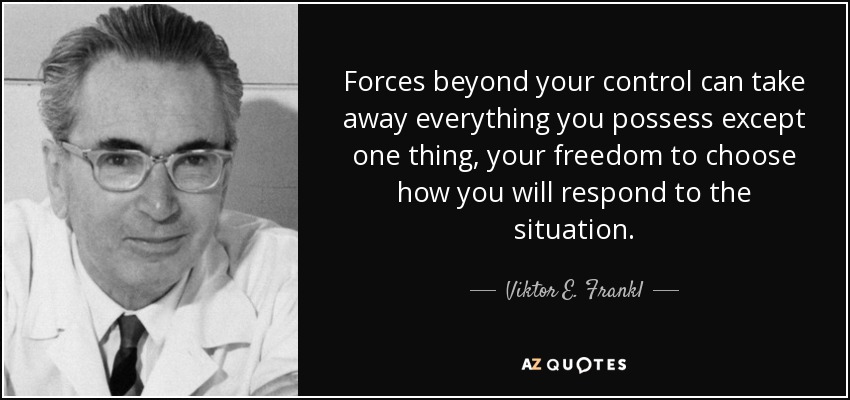
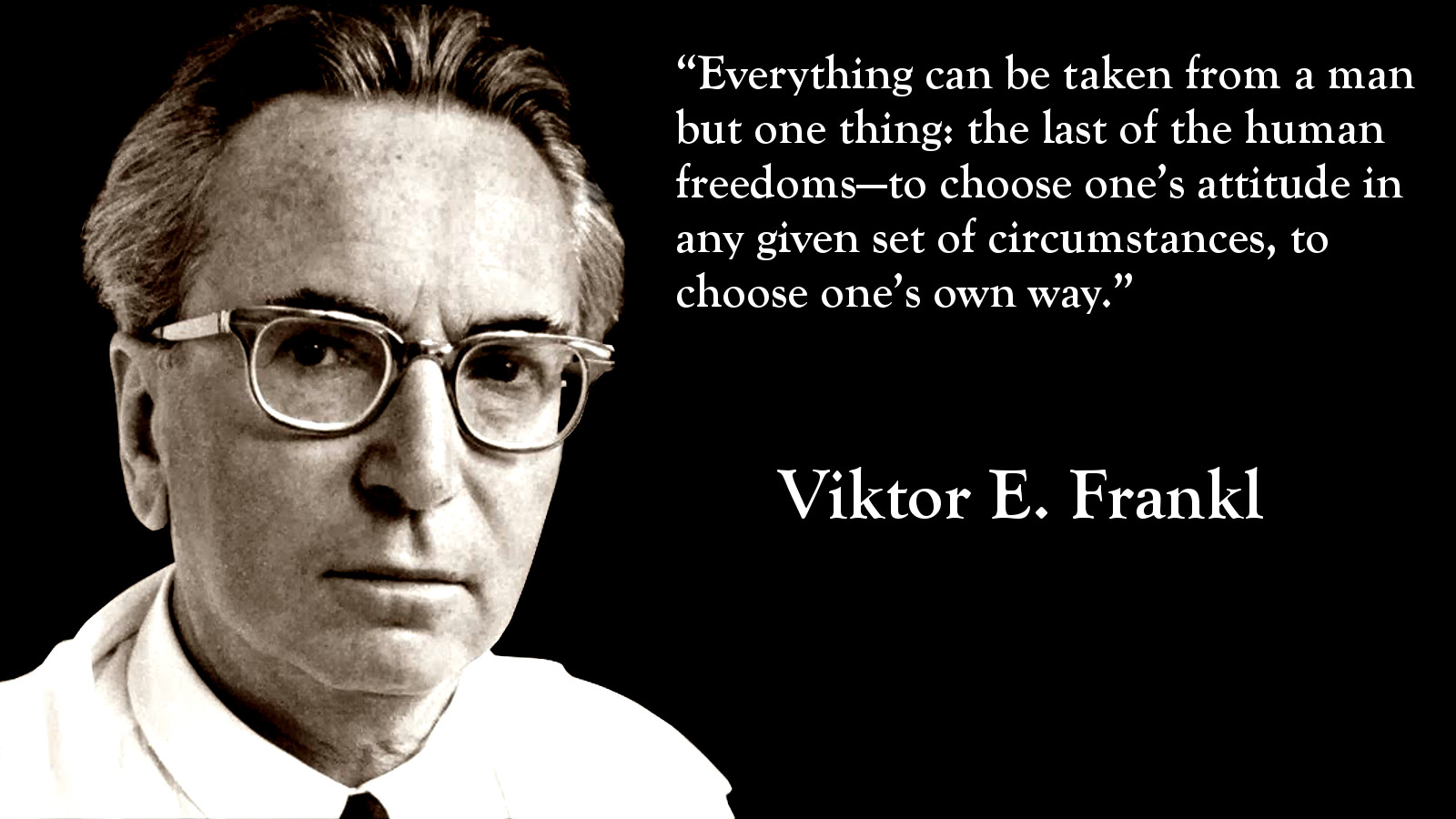


plied to the entrepreneurial context, self-acceptance may be a critical asset, such that effective problem-solving and negotiating through unfolding challenges would seem todemand honest reckoning with one's self. A
honesty is the best policy (especially with oneself!) As it can prevent you from getting in over your head...
without goals, purposes, and meaning, including during periods ofchallenge and difficulty, it is difficult to fathom an entrepreneur who is experiencing genuine well-being. In
(this is related to the question I asked at the end of our last class -- do you envy people who lead an easy life? Where do they find meaning?)
Purpose in life is the existential core of eudaimonic well-being, with its emphasis on viewing one's life has having meaning,direction, and goals. These qualities comprise a kind of intentionality that involves having aims and objectives for living. Life
Purpose in life!
Positive relations with others is the most universally endorsed aspect of what it means to be well. This dimension encompasseshaving warm, trusting ties to others, being concerned about the welfare of others, understanding the give and take of social re-lationships, and having the capacity for empathy and affection.
positive relations!
Personal growth is concerned with self-realization and achievement of personal potential and thus is closest in content toAristotle's ideas about eudaimonia.
Personal growth!

Autonomy, emphasizes thatone is self-determining and independent as well as able to evaluate oneself by personal standards, and if need be, to resist socialpressures to think or act in certain ways. T
AUTONOMY
What relevance, if any, do these eudaimonic components of well-being have for studies of entrepreneurship? Pr
a most useful question...
an fulfillment
human fulfillment doesn't mean one is a fully functioning human...
(Makes me think of teleology and acorns...)
Environmental mastery emphasizes the sense that one can manage the surrounding environment, including making effective useof available opportunities, while also creating contexts suitable to one's personal needs and values. Th
Environmental mastery (tied to social settings and social skills in emotional intelligence...)
igning views of subjective well-being at the time that revolved around assessmentsof happiness, life satisfaction, and positive and negative affect
(mostly) the focus of the other article this week...
The answer for him was eudaimonia, which he described as activity of the soul in accord with virtue. The key task in lifeis to know and live in truth with one's daimon, a kind of spirit given to all persons at birth. Eu
getting very philosophical here (but context is good)
two great imperatives of self-truth (knowthyself) and striving toward excellence consistent with one's given potentialities (become what you are). These ideas deepened thephilosophical significance of eudaimonic well-being
which one is more important? Can you say this? Can one become what one is and live up to one's true potential without knowing oneself? Hmmmmm......
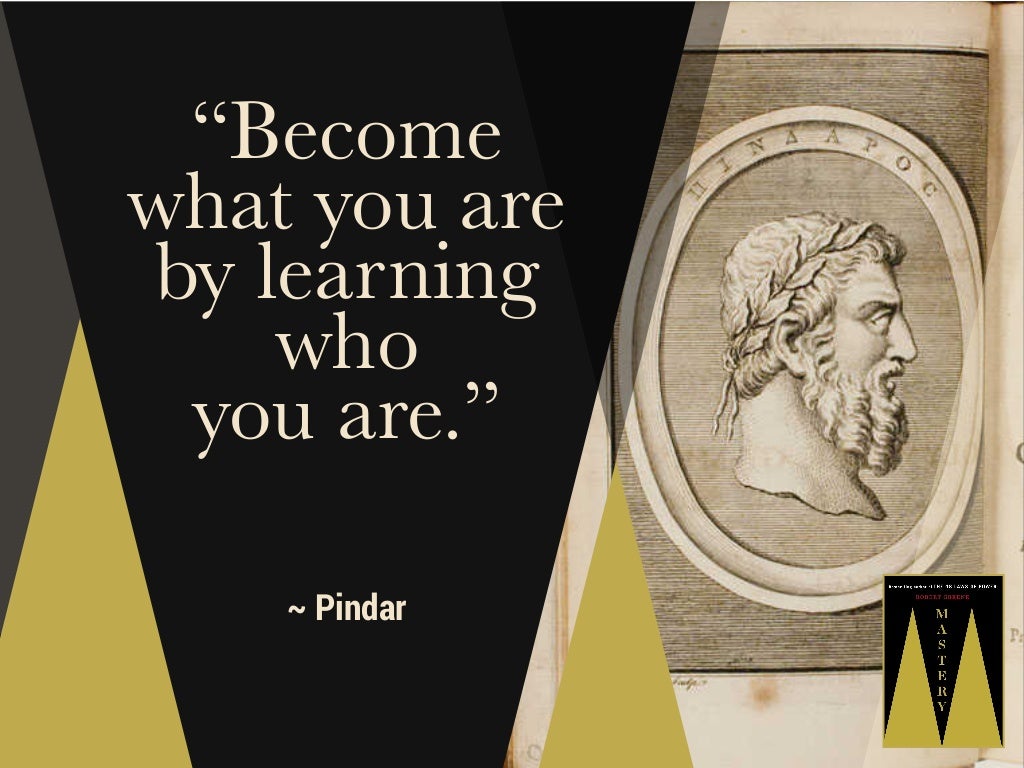
of personalexcellence built on striving to realize one's true and best nature. It
I love how this definition is prefaced with "kind of"
The second venue addresses varieties of entrepreneurship, with a focus on the distinction between opportunity and ne-cessity entrepreneurs.
all righty then...
The first section thus examines the conceptual and philo-sophical foundations of a widely-used model of eudaimonic well-being built on the integration of perspectives from clinical, de-velopmental, existential and humanistic psychology, along with distant observations from Aristotle. These differing views convergedin their emphasis on six distinct aspects of what it means to be fully functioning and well.
telling us what is to follow...
he fifth topic attends to how entrepreneurs impact theeudaimonic well-being of others (employees, families, communities). T
!!
Eudaimonicformulations, in contrast, emphasize multiple facets of well-being such as purposeful engagement, realization of personal potential,autonomy, mastery, quality ties to others, and self-acceptance.
Completely different focus! Well, not "completely" distinct, but shifting focus away from happiness that comes from achieving things to happiness from achieving purpose ...
Hedonic formulations emphasizepositive life evaluations, such as life satisfaction and positive feeling states, such as happiness and positive affect
hedonism - often associated with the pursuit of pleasure.
This article doesn't focus on it a lot (since it emphasizes the other main aspect of well-being), but I'd like to just highlight the connection between hedonism and happiness a little bit here by emphasizing the concept of the "hedonic treadmill".
The hedonic treadmill is a metaphor for the human tendency to pursue one pleasure after another. That's because the surge of happiness that's felt after a positive event is likely to return to a steady personal baseline over time.
So, it looks like this:

This is why I was so interested in the discussion we had at the end of the last class (which we'll continue this week) about money and happiness. Mo money, mo problems. We desire more riches, but we're never satisfied ...
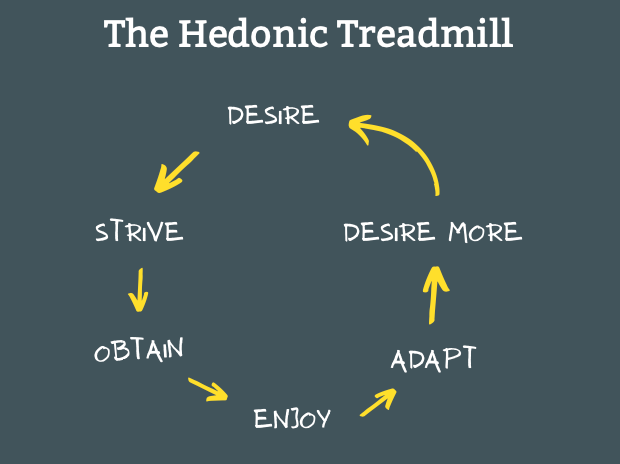
Which is one of the reasons we need to look beyond hedonic well-being and explore eudaimonic well-being!
ive key venues for theentrepreneurial field are then considered: (1) entrepreneurship and autonomy, viewed both as amotive (self-determination theory) and as an aspect of well-being (eudaimonic well-beingtheory); (2) varieties of entrepreneurship (opportunity versus necessity) and eudaimonic well-being; (3) eudaimonia in the entrepreneurial journey (beginning, middle, end); (4) en-trepreneurship, well-being and health; and (5) entrepreneurs and the eudaimonia of others –contrasting virtuous and vicious types.
so, this is going to cover a lot of ground!
urposeful striving and personal growth are demanding, if not stressfulapproaches to living that may not always be conducive to feelings of happiness and contentment.
as we know, trying to find our purpose or constantly "develop"/optimize/life-hack/actualize/etc, isn't always a recipe for happiness (or even "success")
Approaches to well-being tend to be partitioned into hedonic and eudaimonicformulations.
ok - we were already introduced to this distinction in the last article - we're going to get into it more here!
Most entrepreneurial studies have focused on hedonic indicators (life satisfaction,happiness, positive affect).
ok - so we're not going to do that here...
Researchers in entrepreneurial studies are increasingly interested in the psychological well-beingof entrepreneurs.
ok - we are familiar with this rhetorical contextextualizing... (it's the last half of our whole course)
e “dark side”of prosocial moti-vation, which may be good for society, but bad for the well-being of the entrepreneur. Im
oof
orking from a holistic conception of human flourishing that includes social aswell as economic benefits, they distilled three overarching virtues of the excellent/virtuous entrepreneur. These include creativity,beneficence, and integrity.
!
he well-being literature, new findingslinking subjectively reported hedonia and eudaimonia to objectively measured biomarkers (Bo
huh
A first observation is that well-being in extant studies is studied primarily as anoutcome (consequent) of the business venture,
curious - given the next statement...
Entrepreneurial activity, by definition, is self-initiated and hence is fundamentally tied to ideas of autonomy and independence.
makes sense - entrepreneurs value independent thinking...
Fig. 1. Key dimensions of well-being and underlying theo
a fabulously evocative image.
at it means to be mentally healthy,psychosocially developed, purposefully engaged, self-actualized, fully functioning, and mature. No
background...
e vicious entrepreneur is also considered. B
love it -- one can't ignore self-interest!
ey distinction is made between ofautonomy postulated as a core need or motive i
interesting...
key aspects of eudaimonic well-being (e.g., realization of personal potential, purposeful life en-gagement, effective management of complex environments) have received little attention eventhough they may be particularly relevant to entrepreneurial pursuits.
narrowing the focus...
e fourth venue calls for greater research on thehealth, broadly defined, of entrepreneurs via their experiences of well-being.
!
The third venue focuses the unfolding of the entrepreneurial process in time –how it progresses from early stages to longer-term enterprises, at least for some.
ok
tuous entrepreneurship. H
aha - morality again (but distinct from that of social entrepreneurs) ...
The central objective of this essay is to examine the relevance ofeudaimonic well-being for understanding entrepreneurial experience. T
let's take the road less travelled!
meaning was not just about satisfy-ing human appetites, but about doing virtuous things such that we “achieve thebest that is within us”
certainly linked to Csikszentmihalyi's view on happiness!
Stretching entrepreneurs’skills and abilities through flow experiences enhance their resilience andtenacity
ooh! I really like this link to the previous week on perseverance and grit...
In addition to creat-ing a life in which they are happy and feel successful, it appears that it isimportant for them to find work that is also meaningful and purposeful whichfulfills their inner life.
meaningful and purposeful work can also help constitute a happy and successful life (!)
rincipal axis factors(PAF) analysis
unless you're into stats and quantitative measurement, you can skip over these details ... but the social significance rather than the statistical significance of their findings is still trenchant!
Entrepreneurs need internal psycho-logical resources such as intrinsic definition of success and a spiritual practiceto weather the myriad of external storms
like the lingo!
rom this eudaimonicperspective, people are looking for what makes life fulfilling and meaningful.
all right -- leading us into the next article!
The fact that the business provides a source of flow experiences isimportant for entrepreneurs’well-being. Flow is a central construct withinpositive psychology that entrepreneurs can borrow and use to their advantage.
generally accepted as entrepreneurs are assumed to get more meaning and purpose from their work than folk who work for someone/thing else other than themselves...
ubjective well-being was significantlyand positively linked to intrinsic definitions of success while the more extrin-sic/material-driven definitions of success were significantly but negativelylinked to subjective well-being.
yep
intrinsic and extrinsic definitions of success such as: money,social recognition, financial security, power, buying power, engagement, doingwhat they love to do, meaning in my life, and purpose in my life
9 factors to measure what matters ...
entrepreneurs who based their definition ofsuccess on intrinsic factors did experience more well-being than entrepreneurswho based their definition of success on extrinsic-driven factors. In fact, theirwell-being was reduced or declined as their extrinsically driven factorsincreased.
double yep
hepopular media can often portray entrepreneurs to be motivated by more extrin-sic factors such as money or power. However, recent research has found thatentrepreneurs who find meaning in their work are often intrinsically motivated
interesting
Entrepreneurs who work in productive organizations,who get intrinsic spiritual fulfillment from having a job that gives meaning andpurpose to their life, and those who experience flow have a greater sense ofwell-being. Entrepreneurs who have these same factors but define their measureof success in terms of extrinsic factors such as making money and achievingsocial recognition for their achievements exhibited less well-being
operationalizing flow, or success, or productivity is difficult enough -- but operationalizing subjective well-being ... sheesh! I think, for our purposes, it's best to interrogate all of these things and not pinpoint them or measure them but assess how they function within a mix of variables to try and reflect on our own intersection with these concepts. We're not trying to "hack" happiness here, but a bit more accurately map its coordinates so that we can find ourselves there when our internal GPS might be going a little funky...
Subjective well-being questions were asked using the Satisfaction with LifeScale
he original nineflow factors: challenge-skill balance, action-awareness merging, clear goals,unambiguous feedback, concentration, sense of control, loss of self-conscious-ness, time transformation, and autotelic experience
ok! -- there are a number of different tests to capture your capacity for "flow" states...
“In my business everyone gives his/her best efforts”; “In my business workquality is a high priority for all workers”; “I am able to apply my full capabil-ity in my business”, and “My business is very efficient in getting maximumoutput from the resources we have available (e.g. money, people, equipment,etc.)”
wow! When listed in this way, it seems as though most workplaces or types of work might not encourage group productivity. How many of these apply to your work?
The ability for finding meaning at work has been found to be a dominantfactor in the conceptualization and measure of intrinsic success and spiritualityresearch
*
ntrepreneurshipmotivation appears to link to the basis of rewards, which are either driven byextrinsic measures of success (money, social recognition, financial security,power, or buying power) or on intrinsic measures (such as personal fulfillment,doing something I love, finding meaning and purpose in their lives).
**
Entrepreneurs who have an elevated intrinsic definition of success will havegreater subjective well-being than those with elevated extrinsic definition ofsuccess
so, meaning matters more than money when it comes to motivation...
ersonal causesand callings are examples of intrinsic or meaningful objectives. The respon-dents’definition of success included making a difference, creating lastingimpact, and being engaged in a life of personal fulfillment
making a difference (for others...) or making a difference for oneself (being personally fulfilled)...
summing up perceptions of success
“spiritual goals that energize
ooh - a link to next week...
ntrepreneurs whoare doing work they love and who see their work as giving meaning and pur-pose to their lives, and helping others, were more likely to experience personalgrowth and joy
makes sense!
The job of leadership today is not just to make money, it’s to make meaning
not as far as the marketplace is concerned...
“entrepreneurs who practice religious andspiritual values regularly see a significant influence on their happiness, health,joy, productivity, and coping skills”
meaning matters, wherever you find it...
r when they have sufficientresources in their work such as support from colleagues and adequate funds ormaterial
ok...
employees have been found to experience flow when job demands match theirskills
ok
wealth, fame, and power were notthe goals or accomplishments that respondents felt were important for success.Money and recognition were only byproducts of work; they are incidental“outcomes of passionately working often on an entirely different objective thatis often a personal cause or calling”
profits and power are important, but are byproducts of passion (!)
An individual’s well-being is considered a potential source of productivity.On the other hand, an individual’s personal life can be a source of reducedfunctioning.
hmmm
Flow is interesting in a work context because findings indicate that themore individuals experience flow, the more they report control and greatersense of enjoyment in the activity
*
Since uncertainty is central to the entrepreneurialenvironment, it is unclear if the well-being and flow linkage found in otherwork situations extends to entrepreneurial environments.
the testable proposition...
orkers experienced moreflow at work than in leisure.
yowza!
Descriptions of flow commonly include three elements: absorption orimmersion in an activity, enjoyment, and intrinsic motivation
ok!
nce flow isachieved, the attributes are (1) intense focus on the activity at hand and (2)time is perceived to move differently, either more slowly or quickly. The per-son experiences (3) a sense of control and (4) a loss of self-consciousness.There is (5) a merging of action and awareness, that is, the next move is evi-dent. Flow is experienced when (6) challenges and skills are balanced and theperceived challenges of the activity are at or very slightly above the person’sskill level. Usually (7) the experience is rewarding
can you relate this to your own experiences?
remember what I said in my note about happiness and flow in the seminar prompt in week 7 (creative/cultural entrepreneurs)
real happiness lay in the prospect of finding work thatprovided close social relationships, meaning and purpose, pursuit of personalgoals, and being involved in flow activities
sounds sensible enough (even if slightly utopian, moreso than ever in situations of precocity and neoliberal capitalist accumulation)
none of theseare assured in an entrepreneurial environment.
leading to the key insight...
the processof creating art consumed his research subjects and compelled them to losetrack of time, forget to eat, and focus completely on the work. Artistsdescribed being consumed in the process as in the “flow”of it.
!!
These same factors are related to the intrinsic motivators oftenemployed in entrepreneurial perspectives
ooh! a key answer for one of the questions I asked as a seminar prompt in week 7 (about the propensity for people to feel intrinsically motivated to act/achieve goals....)
Since work is a major factor inpeople’s lives –it takes up as much as a half of an adult’s waking life –whatgoes on at work is a major factor in understanding what gives individuals asense of meaning and fulfillment
sad but true (and one of the reasons why entrepreneurial ventures are filled with such hope (because of all those times that one's mundane work life isn't...)
happiness is associated with behaviors that create success, and thathappiness also precedes successful outcomes.
doesn't seem that controversial ... miserable people might be successful, but one doesn't expect it to be sustainable in the face of success (the misery...)
on the other hand, if you're happy (or satisfied), do you strive to achieve greater success?
happiness precedes successful outcomes by creating positive affect, the charac-teristics of which include confidence, optimism, and self-efficacy; likability andpositive construals of others; sociability, activity, and energy; prosocial behavior;immunity, and physical well-being; effective coping with challenge and stress;and originality and flexibility. Positive affect, in turn, encourages activeinvolvement with the environment, and with the pursuit of goals
this is quite the list -- kind of like success breeds more success, the happier you are, the more spillover there is likely to be in other related fields of achievement.
When focusing on psychological well-being, there are generally two perspec-tives: the hedonic/subjective well-being perspective and the eudaimonic/mean-ing perspective.
and we're going to focus on the latter... or at least the other reading does!
Thereare three types of well-being: (1) physical well-being; (2) psychological well-being; and (3) relationship/social well-being
while entrepreneurial activities certainly relate to the well-being of one's physical body and one's relationships, we're going to focus on the psychological...
Feel free to ruminate on the others, though...
the termeudaimonia, or a state of meaningfulness and fulfillment,
eudaemonia is quite distinct!
ristotlebelieved that meaning was not about satisfying human appetites, but aboutdoing virtuous things such that we “achieve the best that is within us
so, eudaemonia relates to self-improvement and self-actualization...
Entrepreneurs who suffer a decline inwell-being may burn out and close their businesses.
D'uh
Extrinsic fac-tors can include financial and social rewards, while intrinsic personal successis often researched using meaning, happiness, and spirituality within the workcontext.
this should resonate with one of the questions I asked you to answer before the first class...
what makes life pleasant and unpleasant (Ryan and Deci2001). Research in this area looks at life satisfaction, positive affect, and nega-tive affect
hedonism is focused on the pursuit of pleasure. What feels good...
Productivity, the second factor examined, can lead to well-being from anextrinsic perspective, since greater productivity would most likely lead togreater success of the organization
whereas flow connects with a sense of intrinsic well-being, productivity relates to extrinsic forces too
Although many factors could lead to increased entrepre-neurial well-being, the present study examines how flow, productivity, andentrepreneurs’own definition of personal success (intrinsic vs. extrinsic)impacts the entrepreneur’s subjective well-being
focal points...
because there's a difference between being entrepreneurial and happy and being entrepreneurial to be happy (down the road...)
Continued engagement is a predictorof entrepreneurial business
we're more likely to continue acting entrepreneurially if it satisfies us (if it gives us a sense of pleasure, or well-being) as a result of pursuing the dream, seeking and creating new opportunities... being bold and innovative and creative... (even though there are risks and great costs associated with these too)
The third factor examined in this study is how an entrepreneur’s de finitionof personal success impacts their subjective well-being.
*
The first factor considered in this study was flow, which describes a state ofcomplete attentional energy focused on the task at hand
already introduced 4 weeks ago...
Yet the directionality is not clear. Are happy workers more productive, orare more productive workers happier?
where do you stand?
Of interest in this paper are the psychological factors that contribute toentrepreneurs’well-being
focusing on one's sense of subjective well-being (otherwise known as happiness).
an entrepreneur must attend to their own individual psy-chological factors of development, such as maintaining a strong sense of confi-dence, optimism, and self-efficacy to cope with uncertainty
link to week 8 (and Baron's article...)
flow has been found to increase work engage-ment (Larson and von Eye 2006, Salanova et al. 2006), to lead to excellencein performance (Demerouti 2006, Bakker 2008), and to make life more inter-esting
adding to (all-around) well-being
Entrepreneurs, like leaders in other organizations, seek organizational produc-tivity for their businesses to prosper.
*
successful entrepreneurship is not really just a story about intelligence inthe traditional sense but more fully a story about successful intelligence—the strategic mergerof analytical, creative, and practical intelligence. All three kinds of intelligence can bedeveloped and are developed through good use of experience.
**
When entrepreneurs and others shape the environment, they are basically applyingsuccessful intelligence to idea generating
!!
A major barrier is convincing people
rhetoric!
In sum, successful entrepreneurship requires one to not only to come up with product andservice ideas but also to know what kind of product or service one has.
underwhelming...
They may end up on used-carlots
that's quite the burn, for an academic article!
People who are high in creative intelligence but not in the otherkinds may be good at coming up with ideas but often are not good either at knowingwhether their ideas are good ones (analytical intelligence) or at selling their ideas toothers (practical intelligence
*
the tests of practical intelligence I mentioned above measure adaptive skills
ok
Successful intelligence is applied in order to balance adapting to, selecting, and shapingenvironments. When one adapts to the environment, one changes oneself in order to fit intothe environment.
how do you demonstrate this?
When oneselects an environment, one decides that adaptation is not worth it.
hmm...
People who are high in analytical intelligence but not the other kinds often aregood memorizers and analyzers, but they need other people’s ideas to remember andanalyze. They make poor entrepreneurs, because entrepreneurs simply must be ideagenerators to succeed
interesting!
This is the option in which entrepreneurs mustspecialize.
this gets into persuasion & rhetoric. In essence, also "selling" but not selling things, but ideas, selling people on your version of reality...
people who are high in practical intelligencebut not in analytical or creative intelligence may be effective salespeople, but they willsell anything.
ouch!
The third option is shaping
!
The most important kind of intelligence for an entrepreneur, or really anyone else, issuccessful intelligence, which involves a balance of analytical (IQ-based), creative, andpractical intelligence
connecting the 3 types of intelligence...
One needs the creative intelligence to come upwith new ideas, the analytical intelligence to evaluate whether the ideas are good ones,and the practical intelligence to figure out a way to sell these ideas to people who maynot want to hear about them
synergy! For success ...
Significant correlations with job-related criteria
hmm
What matters is not the amountof experience one has but how much one has learned from that experience
you probably have experience with this ...
In sum, tests of practical intelligence are useful predictors of job-related skills, independ-ently of IQ-based tests.
underwhelming. This really drives home the fact that this article is good mostly as a shell -- kind-of boring and potentially difficult to see (at least in an immediate fashion) how it can relate in a real sense to students' lives (beyond the idea of multiple intelligences). Still, the lens is really useful for helping us focus on social competence and tacit knowledge (practical intelligence) for moving us forward... and considering what might be necessary in order to achieve success in a given field...
one starts by interviewing successful people in agiven job and asking them for how they performed in the critical incidents that distinguishthose who are highly successful in a field from those who are not. We then try to extract thetacit knowledge underlying the successful actions.
the method...
Route planning
* (who has an internal GPS? Who is lost without a smart phone?)
Tacit knowledge for the workplace. Test-takers are presented with situations typical ofthose encountered in low-level jobs in workplace
classic job interview question...
Trivial correlations with measures of personality and cognitive styles as well. Tests ofpractical intelligence also do not correlate with measures of personal attributes
*
Trivial correlations with IQ-based measures.
*
Tacit knowledge for sales
*
Movies. Individuals are presented with brief fragments of movies showing people their ageconfronting everyday problem
*
ome entrepreneurs leave conventional businesssettings because they are not interested in playing the game of figuring out what the tacitknowledge of the organizational environment is. They would rather play by their own rulesthan learn other people’s.
link to independent spirit and counterfactual knowledge...
Practical mathematics
*
Tacit knowledge for managers
*
Practical everyday inference
*
tacit knowledge is the knowledge that often is most important for success in theworkplace, but it is the knowledge that people must pick up on their own
yowza! School can't teach tacit knowledge!
Of course, people who are high in practical intelligence may also be high in academicintelligence. The two are not necessarily negatively related
hah
Tacit knowledge for school
so tacit knowledge isn't completely absent from school - it's just not testable in school ...
there is actually a negative relation between academic and practical intelligence
interesting
What matters for growth of practical intelligence is not experience but ratherlearning from experience.
(link to the growth mindset)
Modifiability of practical intelligence. Practical intelligence can be developed. Indeed, itmust be developed. People are not born with the kinds of common sense they show in theireveryday lives
crucial insight
tacit knowledge is what one needs to know in order to negotiate an environmenteffectively that typically is not directly taught and that often is not even verbalized
(link to cultural capital) (but also just sensitivity to one's environment and a contextual awareness...)
IQ-based tests, like practical-intelligence tests, predict job success.Both kinds of tests seem to measure intellectual skills necessary for job success
analytical intelligence IS important to fulfill certain job criteria...
The entrepreneurial children, like theentrepreneur in the forest, seemed to have a kind of intelligence not well measuredby conventional tests
Their "street math" was not replicated in the classroom... They exhibited "street smarts" (not book smarts)
Have you ever been in a situation where your book smarts failed you in the "real" world? Contrarily, how often has "street" knowledge helped you in school?
intelligence is not asingle entity.
crucial insight - we have access to multiple intelligences!
Please note - this is definitely related to the "theory of multiple intelligences" (which was the basis for the reality TV series "Canada's Smartest Person"):
https://en.wikipedia.org/wiki/Theory_of_multiple_intelligences
Clearly, more is involved in entrepreneurial success than just the academic side ofintelligence
Think about how often your ability to act in a "socially competent" manner came off as intelligent (a way of adapting to, shaping, and sometimes selecting your environment).
Knowing the right thing to say or how to act (cultural capital) comes off as "smart"
There is obviously more to intelligence than what conventional tests of intelligence
the moral of the story
Successful entrepreneurs appearto be higher in social competence than are unsuccessful ones. In particular, four factors seemto underlie this social competence: social perception (which involves accuracy in perceivingothers), (b) impression management (which involves techniques for inducing positivereactions in others), (c) persuasiveness (which involves the ability to change others’ viewsor behavior in desired directions), and (d) social adaptability (which involves feelingcomfortable in a wide range of situations). These variables, especially social perception,seem to be key to entrepreneurial success.
** remember these 4 factors of social competence! (they will be very helpful next week!)
Successful entrepreneurship requires a blend of analytical, creative, and practical aspects ofintelligence, which, in combination, constitute successful intelligence.
ok - getting right to the heart of it. Introduces the key concepts and emphasizes its 3 parts.
success is defined in terms of personal goals. People succeed byidentifying their strengths and capitalizing on them and by identifying their weaknesses andeither correcting or compensating for them. They do so by adapting to, shaping, and selectingenvironments.
clarifying "success"
Perhaps you know the story of the college professor and the entrepreneur who arewalking in a forest.
funny story - the punchline is at the end of the next paragraph!
Successful intelligenceis the ability to succeed in life, according to one’s own conception of success, within one’senvironmental context.
key concept, defined
sometimes they change themselves to fit the environment; other times,they change the environment to fit them; still other times, they find a different environment
what I was talking about at the end of last Thursday's class...